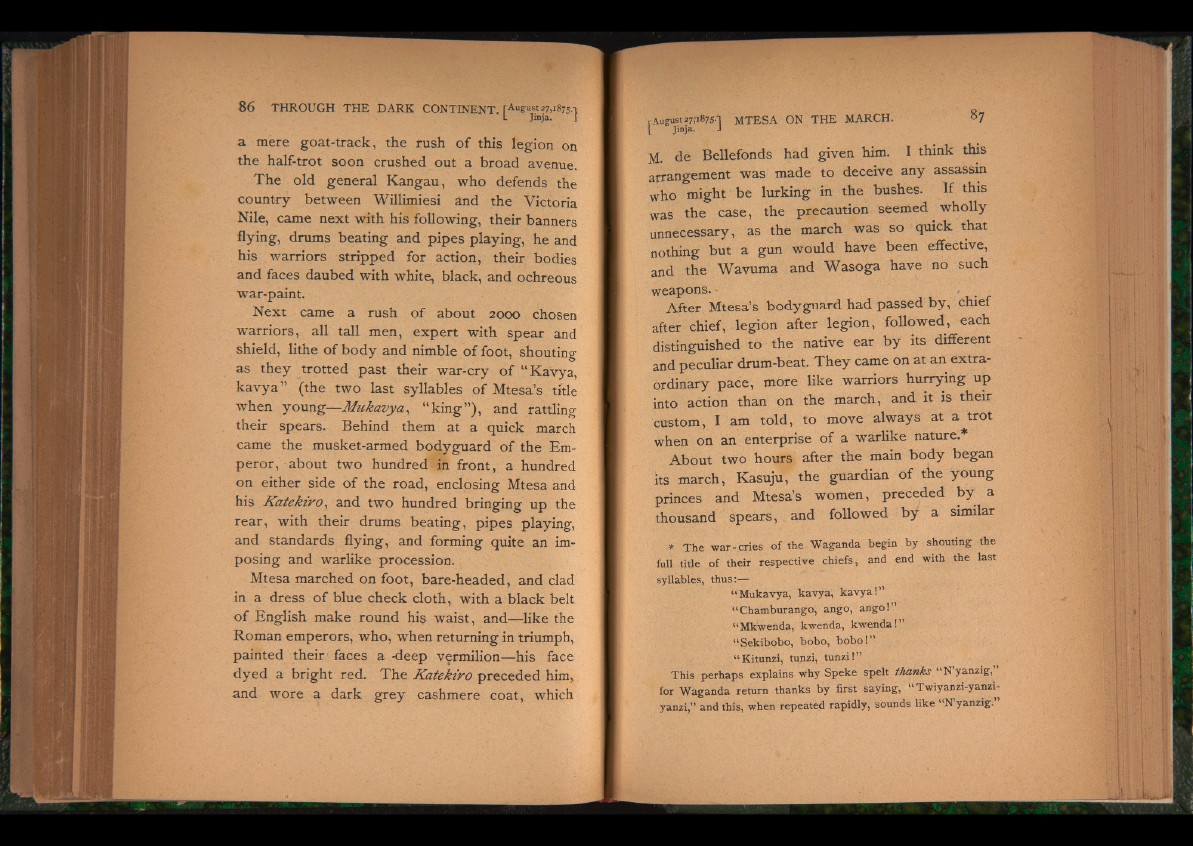
a mere goat-track, the rush o f this legion on
the half-trot soon crushed out a broad avenue.
T h e old general Kang au , who defends the
country between Willimiesi and the Victoria
Nile, came next with his following, their banners
flying, drums beating and pipes playing, he and
his warriors stripped for action, their bodies
and faces daubed with white, black, and ochreous
war-paint.
Next came a rush o f about 2000 chosen
warriors, all tall men, expert with spear and
shield, lithe o f b od y and nimble o f foot, shouting
as th ey trotted past their war-cry o f “ Kavya,
k a v y a ” (the two last syllables o f Mtesa’s title
when young— Mukavya, “ k in g ” ), and rattling
their spears. Behind them at a quick march
came the musket-armed bodyguard o f the Emperor,
about two hundred in front, a hundred
on either side o f the road, enclosing Mtesa and
his K a tek iro , and two hundred bringing up the
rear, with their drums beating, pipes playing,
and standards flying, and forming quite an imposing
and warlike procession.
Mtesa marched on foot, bare-headed, and clad
in a dress o f blue check cloth, with a black belt
o f English make round his waist, and— like the
Roman emperors, who, when returning in triumph,,
painted their faces a -deep vermilion— his face
d yed a bright red. T he K atekiro preceded him,,
and wore a dark g re y cashmere coat, which
rA u g u s t27^1875.1 MTESA ON THE MARCH. 87
L Jinja. J
M. de Bellefonds had given him. I think this
arrangement was made to deceive any assassin
who might be lurking in the bushes. If this
was the case, the precaution seemed wholly
unnecessary, as the march was so quick that
nothing but a gun would have been effective,
and the Wavuma and Wa so g a have no such
weapons. - .
After Mtesa’s bodyguard had passed b y, chief
after chief, legion after legion, followed, each
distinguished to the native ear b y its different
and peculiar drum-beat. T h e y came on at an extraordinary
pace, more like warriors hurrying up
into action than on the march, and it is their
custom, I am told, to move always at a trot
when on an enterprise o f a warlike nature.
A bout two hours after the main b o d y began
its march, Kasuju, the guardian o f the young
princes and Mtesa’s women, preceded b y a
thousand spears, and followed b y a similar
* The war-cries of the Waganda begin by shouting the
full title of their respective chiefs, and end with the last
syllables, thus:—
“ Mukavya, kavya, kavya!”
“ Chamburango, ango, ango!”
“ Mkwenda, kwenda, kwenda!”
“ Sekibobo, bobo, bobo!”
“ Kitunzi, tunzi, tunzi!”
This perhaps explains why Speke spelt thanks “ N yanzig,
for Waganda return thanks by first saying, “ Twiyanzi-yanzi-
yanzi,” and this, when repeated rapidly, sounds like “N yanzig.